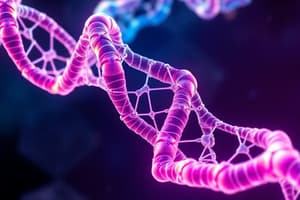Podcast
Questions and Answers
The bonds that stabilize the backbone of the nucleic acids are...
The bonds that stabilize the backbone of the nucleic acids are...
- Peptide bonds
- Ionic bonds
- Hydrogen bonds
- Ester bonds (correct)
Which of the following is a product in a condensation reaction?
Which of the following is a product in a condensation reaction?
- Carbon dioxide
- Hydrogen atom
- Water (correct)
- Oxygen gas
Which of the following is a function of membranes?
Which of the following is a function of membranes?
- Regulation of transport
- Definition of cell and organelle boundaries
- Cell to cell communication
- All of the above (correct)
Which of the following can be components of the extracellular matrix in animal cells?
Which of the following can be components of the extracellular matrix in animal cells?
Plant cells are surrounded by a cell wall. This cell wall has channels called plasmodesmata that permit movement of cytoplasm between neighbouring cells.
Plant cells are surrounded by a cell wall. This cell wall has channels called plasmodesmata that permit movement of cytoplasm between neighbouring cells.
Animal cells are surrounded by a cell wall. This cell wall has channels class plasmodesmata that allow for movement of cytoplasm between neighbouring cells.
Animal cells are surrounded by a cell wall. This cell wall has channels class plasmodesmata that allow for movement of cytoplasm between neighbouring cells.
Adherens junctions and desmosomes are similar to each other in that they both need cadherins and they both are anchored to the cytoskeleton.
Adherens junctions and desmosomes are similar to each other in that they both need cadherins and they both are anchored to the cytoskeleton.
Which of the following is responsible for the impermeability of the epithelium lining the bladder?
Which of the following is responsible for the impermeability of the epithelium lining the bladder?
Each of the following cell junctions is found in intestinal epithelial cells except...
Each of the following cell junctions is found in intestinal epithelial cells except...
Which of the following would you predict to diffuse directly through the lipid bilayer most easily?
Which of the following would you predict to diffuse directly through the lipid bilayer most easily?
The primary difference between N and O-linked glycoproteins is...
The primary difference between N and O-linked glycoproteins is...
Which of the following does not have a role in either cell-cell or cell-ECM adhesion?
Which of the following does not have a role in either cell-cell or cell-ECM adhesion?
Study Notes
Nucleic Acid Structure
- The backbone of nucleic acids is stabilized by phosphodiester bonds.
Condensation Reactions
- Products of condensation reactions typically include water and larger biomolecules such as carbohydrates or proteins.
Functions of Membranes
- Membranes serve as barriers, controlling substance movement in and out of cells and organelles and facilitating communication between cells.
Extracellular Matrix Components
- Components of the extracellular matrix in animal cells can include collagen, glycoproteins, proteoglycans, and fibronectin.
Plant Cell Structure
- Plant cells possess a rigid cell wall that supports structure and has channels known as plasmodesmata for cytoplasmic exchange between neighboring cells.
Animal Cell Structure
- Animal cells lack a traditional cell wall but can form junctions like adherens junctions and desmosomes to maintain connections between cells.
Junctions in Cell Adhesion
- Adherens junctions and desmosomes utilize cadherins for cell adhesion and are anchored to the cytoskeleton, facilitating structural integrity.
Epithelial Cell Characteristics
- The impermeability of the epithelium lining the bladder is primarily due to tight junctions that prevent leakage of substances.
Intestinal Epithelial Cells
- Certain cell junction types, such as gap junctions, may not be present in intestinal epithelial cells, which typically contain tight junctions and desmosomes.
Lipid Bilayer Permeability
- Small non-polar molecules, such as oxygen or carbon dioxide, can diffuse directly through the lipid bilayer most easily due to their size and hydrophobic nature.
Glycoprotein Differences
- N-linked glycoproteins have their carbohydrate groups attached to nitrogen in the amino acid asparagine, while O-linked glycoproteins attach to serine or threonine via oxygen.
Cell Adhesion Roles
- Molecules such as integrins and selectins play roles in cell-cell or cell-extracellular matrix adhesion, while others, like certain lectins, may not facilitate adhesion functions.
Studying That Suits You
Use AI to generate personalized quizzes and flashcards to suit your learning preferences.
Description
Test your knowledge on the bonds that stabilize the backbone of nucleic acids with this quiz. Identify the key interactions that play a crucial role in maintaining the structural integrity of DNA and RNA.



